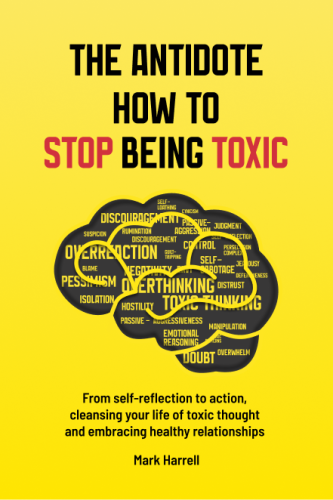 About THE ANTIDOTE HOW TO STOP BEING TOXIC : From Self-Reflection to Action, Cleansing Your Life of Toxic Thought, Cultivating Positive Interactions, and Embracing Healthy Relationships:
About THE ANTIDOTE HOW TO STOP BEING TOXIC : From Self-Reflection to Action, Cleansing Your Life of Toxic Thought, Cultivating Positive Interactions, and Embracing Healthy Relationships:
Have you ever been the unlucky victim of toxic behaviors or the one doing them and felt trapped?
“How to Stop Being Toxic” is more than just a book; it’s a lifeline for those seeking salvation from the tumultuous waves of toxic behavior that have long battered their lives.
Within these pages lies a comprehensive toolkit to reconstruct your thought patterns, detoxify your behaviors, and foster a nurturing environment for growth. Learn how to:
1. Identify and dismantle the toxic traits within you and around you.
2. Develop self-reflection practices that lead to genuine self-improvement.
3. Implement effective communication techniques to avoid misunderstandings and conflict.
4. Establish and maintain strong boundaries for a balanced, respectful life.
5. Build and nurture relationships based on trust, support, and mutual respect.
6. Forge a sustainable lifestyle that encourages ongoing personal development.
Take the first step towards a more positive existence and leave toxicity in your wake with “How to Stop Being Toxic.” Your journey to a healthier, happier you begins here.
Buy the book:
Author Bio:
Mark Harrell is a behavioral scientist renowned for his deep dives into the intricacies of human behavior and the effects of toxic thinking on personal growth and relationships. With an academic background steeped in the study of psychology, Mark has devoted his life to the pursuit of knowledge in the realm of personal development and emotional health.
Harrell has spent over a decade researching social psychology and cognitive behavioral therapy, which has informed his compassionate yet analytical approach to writing. His work is characterized by a blend of evidence-based insights and personal anecdotes, providing a relatable and authoritative voice on the subject of self-improvement.
Mark’s unique perspective is shaped by his own journey through overcoming negative thought patterns, which he transparently shares to validate and empower his readers.
For the writer tasked with translating Mark Harrell’s insights into a compelling and practical guide, it is essential to strike a balance between scholarly content and conversational readability. Mark’s writing style is informative yet engaging, aiming to demystify the science of behavior while providing actionable steps for readers. By keeping in mind his personal experiences and academic background, the writer should be able to capture Mark’s voice and deliver a manuscript that resonates with those seeking to transform their lives by shedding toxicity and embracing positivity.